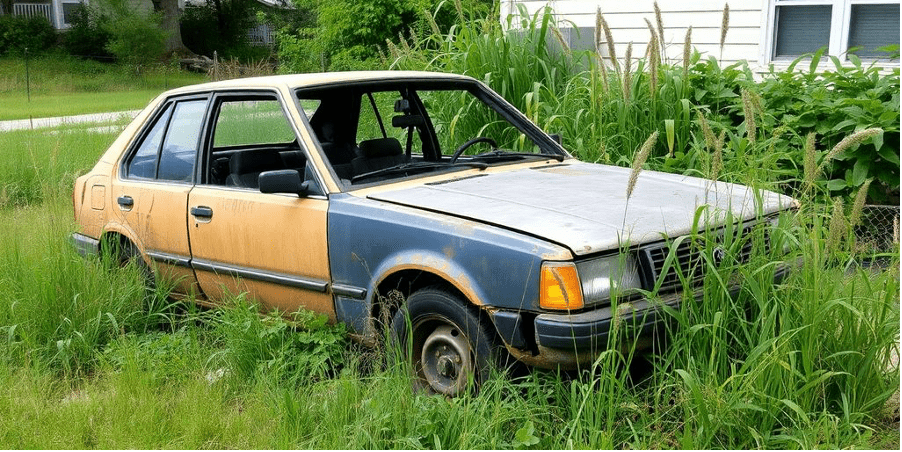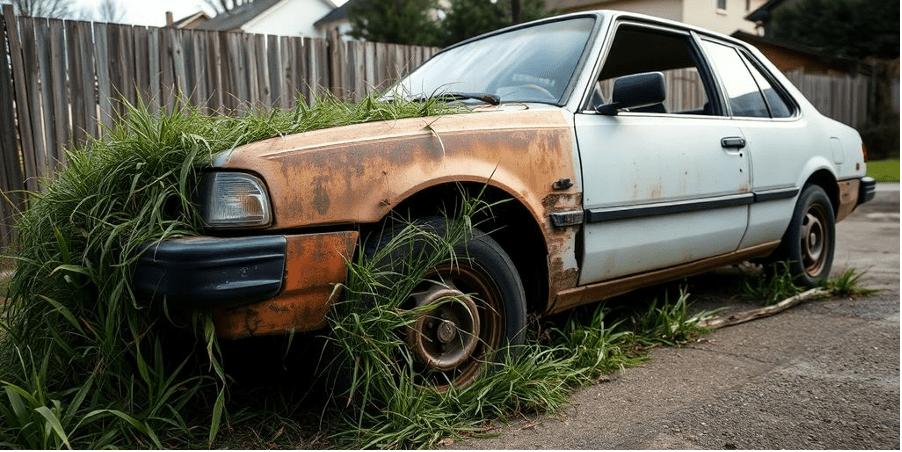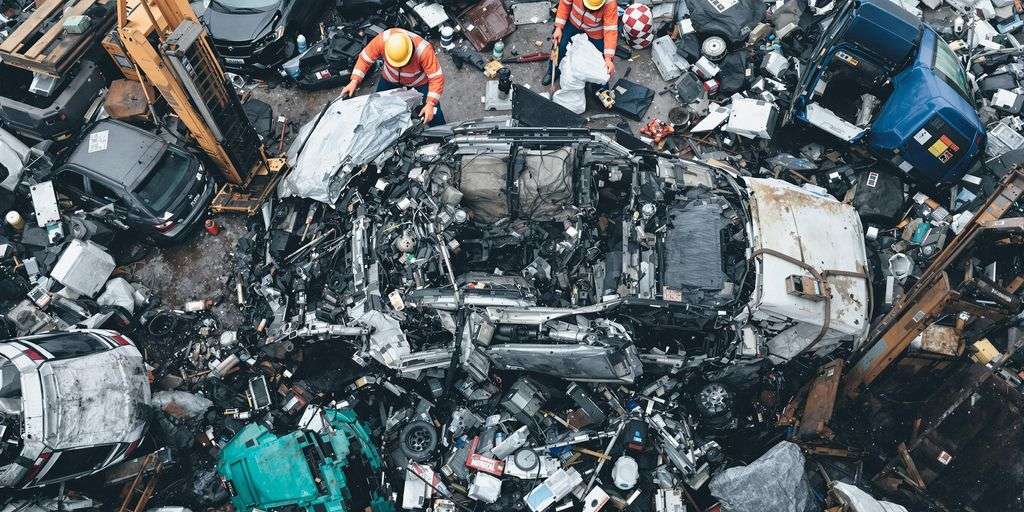Key Takeaways
- Junk cars often need to meet specific criteria to be classified as such, like being over 5 years old or significantly damaged.
- Local laws vary widely, so it's key to check your city or county's regulations on car scrapping.
- Having a junk car can lower your property's value and might annoy your neighbors, leading to complaints.
- Proper disposal and recycling of junk cars help avoid legal issues and can even be profitable.
- Keeping up with local laws and documenting your car's status can save you from fines and headaches.
Understanding the Legal Definition of a Junk Car
Criteria for Classifying a Vehicle as Junk
So, what really makes a car a “junk car”? It's not just about being old or rusty. Typically, a vehicle is considered junk if it ticks a few boxes: over five years old, heavily damaged, can't move on its own, or only good for scrap. Often, it must meet three out of these four criteria: missing wheels, badly damaged, unable to run, or left sitting around for ages. This isn't just about aesthetics; it's about functionality and safety.
Common Misconceptions About Junk Cars
A lot of folks think any old car is a junk car, but that's not the whole story. Age alone doesn't make a car junk. Some believe if a car's not running, it's junk. But sometimes, it's just a minor fix away from being on the road again. Another myth is that junk cars are worthless. In reality, they can be a treasure trove of parts or scrap metal. It's not just a pile of rust; it could be a mini goldmine.
Legal Implications of Owning a Junk Car
Owning a junk car isn't just about dealing with an eyesore on your property. There are legal angles to consider. Local laws might limit how many you can have sitting around, and ignoring these rules can lead to fines or other legal headaches. Plus, a junk car can drag down your property value and even cause friction with neighbors. It's crucial to know the local regulations in your area, like those in Washington State, to avoid any unwanted surprises.
Keeping a junk car on your property isn't just about space; it's about understanding the rules that come with it. Make sure you're in the know to keep things smooth with the law and your neighbors.
Local Regulations and Ordinances on Scrapping Cars
State-Specific Laws on Vehicle Scrapping
When it comes to scrapping a car, different states have their own set of rules. These laws are not just random; they are designed to protect the environment and ensure that vehicles are disposed of responsibly. For instance, some states require you to have a title to scrap a car, while others might allow you to go ahead with just a bill of sale. It's important to check what your state mandates because failing to comply can lead to fines or other legal issues.
City and County Ordinances
Beyond state laws, local ordinances also play a big role in car scrapping. Cities or counties may have specific rules about where you can store a junk car or how many you can keep on your property. For example, some places limit the number of unregistered vehicles you can have, while others might have strict guidelines on how these vehicles should be stored. Ignoring these local laws can result in hefty penalties.
Penalties for Non-Compliance
Not sticking to the rules can cost you. Penalties for not following vehicle scrapping regulations vary but can include fines, towing costs, and even legal action. Some areas might impound your vehicle if it's not disposed of correctly. It's crucial to understand these penalties to avoid unnecessary expenses. By staying informed about both state and local regulations, you can scrap your car without any legal hassles.
Impact of Junk Cars on Property and Neighborhood
Effects on Property Value
Junk cars are more than just an eyesore; they can seriously drag down the value of your home and even your neighbors'. Imagine trying to sell your house while a rusting old car sits out front—not exactly a selling point, right? This isn't just about aesthetics; it's about dollars and cents. Studies show that abandoned vehicles can lead to a domino effect, depreciating property values in the neighborhood. If you've got more than one junk car, the impact can be even worse. It's something to think about if you're considering holding onto that old clunker for sentimental reasons.
Aesthetic and Environmental Concerns
When it comes to aesthetics, junk cars are basically the neighborhood's worst nightmare. Missing wheels, rusting metal, peeling paint—these aren't just minor issues. They scream neglect and can make even the nicest house look run-down. But it's not just about how things look. Junk cars can also be an environmental hazard. We're talking about leaking fluids that can seep into the ground and harm local wildlife. So, if you're thinking about keeping that old car around, consider the broader impact on both your property and Mother Nature.
Safety Hazards Associated with Junk Cars
Safety is another biggie that often gets overlooked. Junk cars can be downright dangerous. We're talking sharp edges, leaking fluids, and even fire risks if there's old fuel or oil involved. Kids playing nearby? That's a recipe for disaster. And let's not forget about the pests—rats and other critters love to make a home in these abandoned vehicles. Keeping junk cars around is like inviting trouble into your yard. It's essential to recognize these hazards and take action to mitigate them.
Proper Disposal and Recycling of Junk Cars

Methods for Recycling Car Parts
Getting rid of a junk car isn't just about towing it away. There's a whole process to it, especially if you want to do it right and maybe make some cash on the side. Recycling car parts is a smart move. Think about it: engines, transmissions, and even doors can find a new life. Start by removing these valuable parts. Next, drain any fluids like oil or coolant. This isn't just for the environment; it makes the parts more appealing to buyers. Finally, separate the metal from plastic and glass. This way, you're maximizing what's reusable.
Benefits of Proper Disposal
Properly disposing of junk cars does more than just clear up space. It has a bunch of benefits. First, it helps keep your property looking tidy, which is always a plus. Secondly, it prevents any potential legal issues that might arise from having an eyesore on your land. But it's not just about legality and looks. Proper disposal can also be good for the environment. By recycling parts, you're reducing the need for new materials, which saves energy and resources.
Legal Requirements for Car Disposal
So, what's the legal side of things? Well, every area has its own rules. Generally, you'll need to prove ownership before you can scrap a car. This means having the title in hand. Some places might require you to notify them when you're about to dispose of a vehicle. It's also important to know how many junk cars you can legally keep on your property. Ignoring these regulations can lead to fines or other legal headaches. Always check with your local authorities to stay on the safe side.
Dealing with Neighbor Complaints and Legal Disputes

Common Neighbor Concerns
Living next to a property cluttered with junk cars can be frustrating. Neighbors often worry about how these eyesores might affect their own property values or the neighborhood's overall appeal. Additionally, there are concerns about safety hazards, such as the risk of fire or injury from rusty metal parts. Addressing these issues openly can help maintain community harmony.
Legal Steps to Address Disputes
When a neighbor's junk cars become a problem, it's essential to know your legal options. Start by checking if there are any local ordinances that regulate the accumulation of such items. If a friendly chat with the neighbor doesn't resolve the issue, consider these steps:
- Document the situation with photos and notes.
- Research local laws and gather evidence of any violations.
- File a formal complaint with your local government or code enforcement office.
These steps can help ensure that any action taken is backed by legal grounds, reducing the chance of unnecessary conflict.
Maintaining Good Neighbor Relations
It's always best to handle these situations delicately. Approach your neighbor with empathy, acknowledging their perspective. Sometimes, they might see the cars as potential projects or investments. Suggest a compromise or offer assistance in finding a solution, like helping remove the vehicles.
Open communication and a willingness to work together can prevent small issues from escalating into major disputes. By keeping the dialogue positive and constructive, you can often resolve problems without damaging your relationship.
Financial Considerations When Scrapping a Car
Scrapping a car can bring about several financial aspects that you need to weigh carefully. Whether you're looking to make some money or just cover the costs of removal, understanding these financial considerations is vital.
Estimating the Value of Scrap Parts
When you decide to scrap your car, the first thing you might wonder about is how much you can get for the parts. Knowing the value of each part can help you maximize your return. Here's a simple way to approach it:
- Research Prices: Check local salvage yards, online marketplaces like eBay, or sites that buy scrap cars.
- List Valuable Parts: Engines, transmissions, and catalytic converters often fetch good money.
- Keep a Record: Maintain a list of parts and their estimated values to get a comprehensive picture.
Cost of Towing and Disposal
Getting rid of a junk car isn't always free. Sometimes, you might need to pay for towing and disposal services. Here’s what you should consider:
- Towing Fees: Depending on the distance and service provider, towing can cost anywhere from $50 to $150.
- Disposal Costs: Some junkyards might charge a fee to take your car, especially if it’s not running.
- Free Options: Look for services that offer free towing if you sell them your car.
Potential Profits from Selling Parts
Selling parts individually can sometimes be more profitable than scrapping the whole car. Here’s how you can make the most of it:
- Identify High-Demand Parts: Parts like alternators, starters, and tires can be sold separately.
- Use Online Platforms: Websites like Craigslist or Facebook Marketplace can connect you with buyers.
- Negotiate Prices: Be open to negotiations to ensure you get a fair price.
Scrapping a car isn't just about getting rid of an old vehicle; it's an opportunity to make some money back. By understanding the value of your car's parts and the costs involved, you can turn a potential loss into a financial gain.
Remember, car scrapping policies not only offer financial incentives but also enhance safety and promote environmental sustainability. By recycling your old car, you contribute to a cleaner, safer environment while potentially pocketing some cash.
Tips for Maintaining Compliance with Local Laws
Regularly Reviewing Local Regulations
Staying on top of local regulations is like trying to keep up with the latest tech gadgets—always changing and sometimes confusing. But it's super important. Regularly checking your city's ordinances about junk cars can save you a lot of headaches. You don't want to be that person who gets fined just because you missed a new rule. Make it a habit to check your local government's website or contact them directly every once in a while. It's like checking the weather before going out—you just gotta do it.
Documenting Vehicle Status
Keeping records might sound boring, but it's useful. Snap some photos of your vehicle's condition every few months. Jot down any changes or repairs you've made. This way, if anyone questions whether your car is actually junk, you've got proof. Think of it like taking progress photos for a fitness journey—except it's your car's journey.
Consulting with Legal Experts
Sometimes, things get complicated. Maybe the rules are as clear as mud, or you're dealing with a sticky situation involving a neighbor's complaint. In these cases, chatting with a legal expert can be a lifesaver. They can help you understand the nitty-gritty details and make sure you're on the right side of the law. It's like having a tour guide in a foreign city—they help you navigate the unknown.
Keeping up with local laws isn't just about avoiding fines—it's about being a good neighbor and keeping your property looking sharp. Plus, it helps you avoid those awkward conversations with city officials or neighbors who might not share your love for vintage car projects.
Conclusion
So, is it legal to scrap a car on your property? Well, it all boils down to where you live and what the local laws say. Some places are pretty strict about how many junk cars you can have, while others might not care as much. It's a good idea to check with your local authorities to avoid any fines or legal headaches. Plus, keeping your property looking nice not only keeps the neighbors happy but can also help maintain your home's value. If you're thinking of parting out your car, remember there are options like selling parts online or to local salvage yards. Just make sure you're doing it by the book. At the end of the day, being informed and considerate can save you a lot of trouble.
Frequently Asked Questions
Can I keep a junk car on my property?
Yes, but there are usually local rules about how many and where you can keep them. It's best to check with your city or county.
What defines a car as ‘junk'?
A car is often called ‘junk' if it's over 5 years old, badly damaged, can't move, or is only worth its parts.
How can junk cars affect my property?
Junk cars can make your property look bad, lower its value, and might even be unsafe.
Are there penalties for not following car scrapping laws?
Yes, you might have to pay fines if you don't follow local rules about junk cars.
How can I sell parts from my junk car?
You can sell parts to local salvage yards, on websites like Craigslist or eBay, or to scrap buyers.
What should I do if my neighbor complains about my junk car?
Try talking to them and see if you can find a solution together. If not, you might need to check local laws or get legal help.



